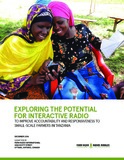| dc.contributor.author | Gilberds, Heather | |
| dc.contributor.author | Handforth, Calum | |
| dc.contributor.author | Leclair, Mark | |
| dc.coverage.spatial | Tanzania | en |
| dc.date.accessioned | 2017-01-30T09:20:41Z | |
| dc.date.available | 2017-01-30T09:20:41Z | |
| dc.date.issued | 2016-12 | |
| dc.identifier.citation | Gilberds, H. with Handforth, C. and Leclair, M. (2016) Exploring the potential for interactive radio to improve accountability and responsiveness to small-scale farmers in Tanzania, Ottawa: Farm Radio International | en |
| dc.identifier.uri | https://opendocs.ids.ac.uk/opendocs/handle/20.500.12413/12770 | |
| dc.description.abstract | What are the possibilities of using new digital technologies alongside radio to help ensure that agricultural development projects are farmer-centred, and meet the needs of the rural citizens they intend to serve? This research assesses Farm Radio International’s Listening Post – a model that combines radio and digital technologies with the aim of collecting and aggregating farmer feedback to aid decision-making and adaptive project implementation. The research shows that linking a mobile-based crowd-sourcing tool with radio is effective at ensuring engagement from a large number of farmers, who felt it was a useful way of raising their questions and concerns to NGOs, policy-makers and experts. The model has clear potential to strengthen the chain of relationships between citizens, extension services suppliers, projects and policymakers. It has also demonstrated its potential to collect real-time feedback from farmers that could be used to aid decision-making and improve accountability in agricultural development initiatives, helping to ensure they are more responsive to farmers. However, it also concludes that ‘closing the feedback loop’ – ensuring that farmer’s comments, questions and concerns are responded to – is a challenge for the Listening Post. Sometimes, the interactive radio programmes close the loop by disseminating answers to questions or concerns raised by farmers, or by connecting farmers to extension services – but only when a solid and systematic process had been developed for this to happen. Therefore is critical to identify and incentivise actors who are capable of responding during the design phase of a Listening Post, and to ensure that they are involved in every stage of the process. It also important that project partners who are interested in beneficiary feedback identify the flexible or actionable points in their project frameworks from the outset, rather than collecting data that they are not able to use to adapt their programmes | en |
| dc.description.sponsorship | DFID | en |
| dc.description.sponsorship | USAID | en |
| dc.description.sponsorship | Omidyar Network | en |
| dc.description.sponsorship | SIDA | en |
| dc.language.iso | en | en |
| dc.publisher | Farm Radio International | en |
| dc.rights.uri | http://www.ids.ac.uk/files/dmfile/IDSOpenDocsStandardTermsOfUse.pdf | en |
| dc.subject | Agriculture | en |
| dc.subject | Governance | en |
| dc.subject | Participation | en |
| dc.subject | Politics and Power | en |
| dc.subject | Rural Development | en |
| dc.title | Exploring the potential for interactive radio to improve accountability and responsiveness to small-scale farmers in Tanzania | en |
| dc.type | Other | en |
| dc.rights.holder | Farm Radio International | en |
| dcterms.dateAccepted | 2016-12 | |
| rioxxterms.funder | Default funder | en |
| rioxxterms.identifier.project | Default project | en |
| rioxxterms.version | NA | en |
| rioxxterms.funder.project | c941507f-fd0b-4fc3-9822-4b2132f61a1d | en |

